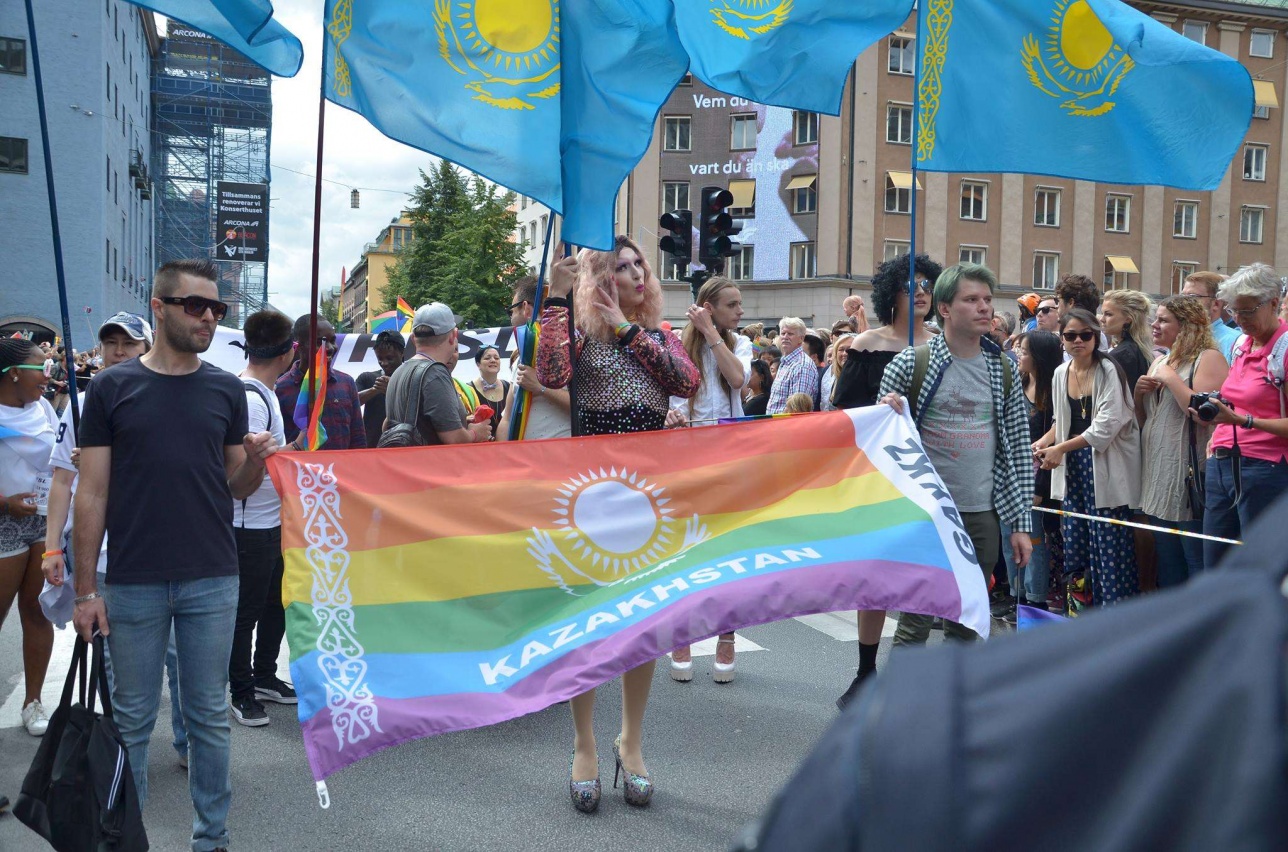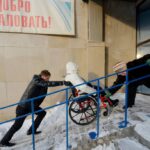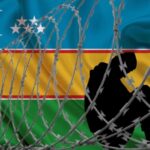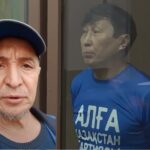Kazakhstan’s social media has been shaken this week by a photo that tells of a family tragedy triggered by the police massacre of striking oil workers at Zhanaozen on 16 December 2011.
The photo, posted on facebook by Zhadyra Kenzhebaeva, a young mother of two children, shows: Bazarbai Kenzhebaev, Zhadyra’s father, who died after police arrested and tortured him on the day of the Zhanaozen massacre; Zhadyra’s mother Tilektes Kanatbaev, who died in 2013 after mourning her husband for 17 months; and Zhadyra’s sister Asem Kenzhebaeva, who campaigned to bring Bazarbai’s torturers to justice, before her own death in 2014.
The Zhanaozen shootings – in which 16 people died and more than 60 were injured, according to official figures – brought to an end six months of strike action by thousands of workers in the western Kazakhstan oil field.
The police opened fire on unarmed demonstrators in Zhanaozen’s main square – oil workers, whose demands for pay rises and democratic trade union representation had been met by mass sackings and violence by management thugs, and local people who turned out to support them.
Bazarbai Kenzhebaev was not an oil worker and was not demonstrating. He had travelled in to Zhanaozen from his home in the village of Kyzylsai, to visit Zhadyra, who had given birth to her daughter Aisuna that day in the maternity hospital.
As he walked to the hospital, Bazarbai, a 50-year-old tractor driver, got caught up in a frenzied police round-up of demonstrators, suspected demonstrators, and anyone they could lay their hands on. He was beaten, pushed into a crowded cell, and forced with other detainees to walk between two lines of riot police who beat them with sticks.
Investigators beat Bazarbai again as they tried to make him confess to robbery. They then threw him, bleeding from multiple wounds, into a garage, where he and other detainees, many half dressed and all with bare feet, stood for hours on a cold, wet floor. He was released after repeated protests by his relatives.
Five days later, on 21 December, Bazarbai died, probably from a burst intestine. He had been in such pain that he had not been able to hold his new baby grand-daughter in his arms. And two days after that, Russia’s renowned campaigning newspaper Novaya Gazeta published an interview that Bazarbai gave before his death (here, Russian only) detailing the extent of the Zhanaozen tortures.
Bazarbai’s wife Tilektes Kanatbaeva passed away in May 2013, just under a year and a half after him. Family and friends say she died of grief.
One of the couple’s three daughters, Asem Kenzhebaeva, who had gone to look for her father when he failed to return on 16 December 2011, was also detained and mistreated – and for months afterwards complained of pain in her kidneys. But she continued both to work to support her son, and to campaign for justice in her father’s case.
Despite the wealth of evidence that Bazarbai and others were tortured, the authorities refused to investigate. Torture victims were among the 17 people tried for “inciting social discord” in May 2012 and sentenced to prison – with confessions obtained by torture being accepted as evidence in court.
Asem and other campaigners secured only the prosecution of a duty officer, Zhenisbek Temirov, who was convicted of illegally detaining Bazarbai and failing to send him to hospital, and served a short prison sentence.
But on 13 December 2014, Asem Kenzhebaeva died aged 24, leaving a five-year-old son, Anuar (see here, Russian only). As well as Zhadyra, she also left another sister and two brothers.
This month Zhadyra Kenzhebaeva spoke of her own struggle to bring up her daughters Aruzhan and Aisuna (now six and four). Her interview with journalist Kazis Toguzbaev (here, Russian only) told a too-often-repeated story of a young woman in a working-class community.
In 2014 Zhadyra’s husband sold the family’s flat in Zhanaozen and bought a house in Kyzylsai village that was registered in their joint names. But their relationship was failing. Last year, Zhadyra left, fearing her husband’s violence. He was drinking, using drugs and having relationships with other women. Now he has disappeared, and Zhadyra can neither sell the jointly-owned house nor keep up with payments on it. She is living with her two daughters in a one-bedroom flat in Zhanaozen.
A world away from Zhadyra, former UK prime minister Tony Blair was also in the news this week – after the Times newspaper uncovered new details of his lucrative contracts with the Kazakhstan authorities (partial access only, here). It turns out that not only did Blair advise president Nursultan Nazarbayev on how to excuse the Zhanaozen killings to western audiences – he has also been paid handsomely to help the authorities in Mangystau region (in which Zhanaozen is the largest town) with a makeover.
Seven months after the Zhanaozen massacre, Nazarbayev gave a talk at Cambridge university – and said that the killings, “tragic though they were”, should not “obscure the enormous progress” being made in Kazakhstan. Tony Blair Associates, the former prime minister’s company, had been paid to advise on the wording.
This week the Times reported that Tony Blair Associates has also been advising the Mangystau region authorities on diversifying the local economy. The region’s governor, Alik Aidarbayev, had a senior job in Kazmunaigaz – the company for which most of the striking oil workers worked – at the time of the Zhanaozen massacre. He switched to his political job in 2013, and started paying Tony Blair consultancy fees shortly afterwards.
The Times reports that Blair went to Mangystau several times in 2014 and 2015. And he helped persuade an Egyptian billionaire, Naguib Sawiris, to build a luxury resort on the Caspian coast near Zhanaozen. That probably won’t be much help to a single mother like Zhadyra Kenzhebaeva.
There could hardly be a more basic issue of human rights than the one on which Zhadyra’s sister Asen campaigned – the need to bring to justice torturers, and those who order torture. Neither Tony Blair, nor Prince Andrew (another regular visitor to Kazakhstan), nor any of the UK politicians who deal with Kazakhstan, nor any of the UK companies who deal with Kazmunaigaz, nor any of the UK investors who invest in Kazmunaigaz, have ever breathed a word about the police shootings and the torture that killed Bazarbai Kenzhebaev. Workers’ organisations in the UK and internationally have campaigned, and continue to campaign, for justice in the Zhanaozen cases. GL, 20 April 2016.
SOURCE:

















